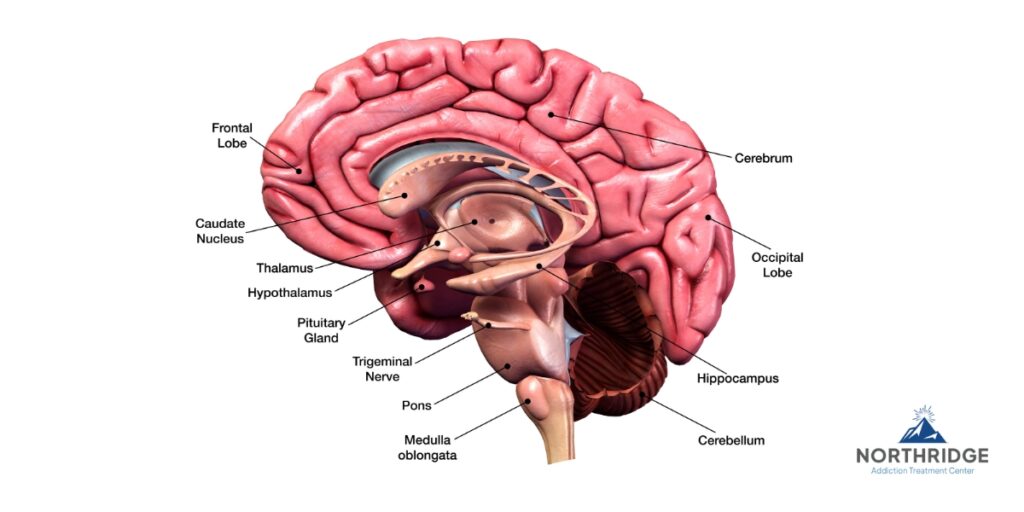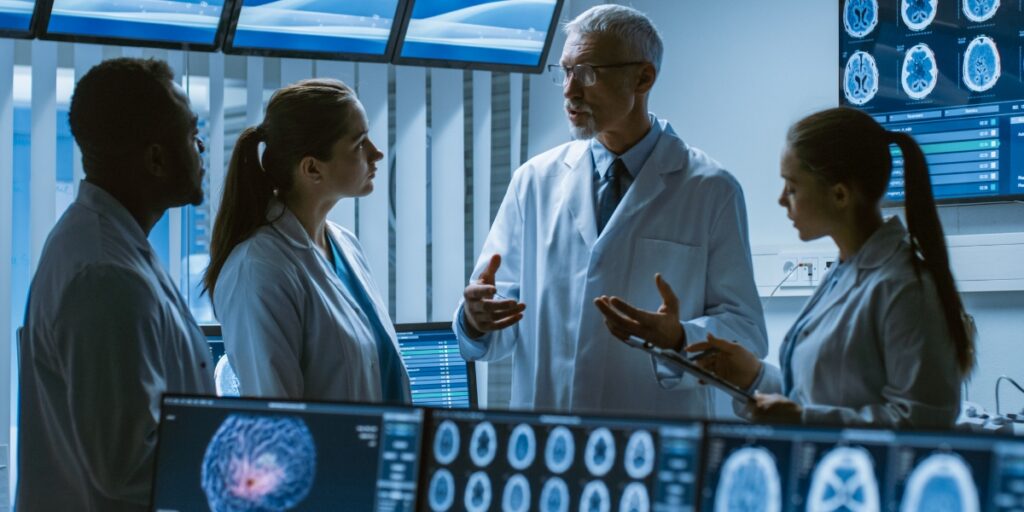Does Alcohol Cause Brain Damage?

Most people are familiar with the immediate effects and dangers of drinking, but few understand how long-term alcohol abuse can cause brain damage with other permanent effects.
Researchers have been able to study alcohol-related brain changes and damage in people who consumed alcohol in varying amounts and different lengths of time. People who were light or infrequent drinkers showed some short-term changes that resolved quickly, while people with alcohol use disorders showed the most physical and biological changes in their brains.
The changes in brain function lead to a wide range of physical and mental health changes and sometimes permanent brain damage. Remarkably, most people who received help for alcohol use and stayed in recovery for a year or longer showed evidence of the brain damage healing partially or entirely.
Alcohol and Dopamine
When alcohol enters the system, it raises dopamine levels, which causes the relaxed, happy feeling people get when they consume small amounts of alcohol. Besides the physical effects of alcohol, this creates a psychological association between drinking and enjoyment.
Dopamine is a messenger between the brain and body and a hormone to produce chemical reactions and feelings. It is one of many chemicals the brain naturally produces to help regulate biological and brain functions.
Some of the things dopamine is responsible for include:
- Motivation
- Sense of reward and pleasure
- Mood regulation
- Memory and cognition
- Coordination
- Sleep cycles
- Sex drive
- Lactation
- Digestion
Dopamine is one of the primary chemicals alcohol interacts with to cause the positive and negative effects of drinking. When moderate or heavy drinking becomes a regular occurrence, the brain relies on alcohol for dopamine and makes less on its own; when a person quits drinking, dopamine levels crash until the brain produces dopamine again naturally. Binge drinking can also cause a drop in dopamine levels in the following days.
Some of the side effects of low dopamine include:
- Depression
- Mood swings
- Memory loss
- Disrupted sleep cycles
- Sexual dysfunction
- Constipation
- Tremors
- Increased risk of Parkinson’s disease
The most dangerous effect of low dopamine levels in people who drink heavily and then stop is alcohol withdrawal syndrome, which ranges from mild to life-threatening without proper treatment.

What Parts of the Brain Does Alcohol Affect?
Alcohol affects every brain region, and the damage worsens with continued alcohol consumption. Researchers have used brain scans and imaging, blood work, hormone analysis, and a wide range of long-term studies to get a detailed picture of how alcohol affects brain functions.
The brain is similar to a highly efficient supercomputer, with each section responsible for specific tasks, sending and receiving billions of signals to carry them out every second. Below is a brief overview of brain areas in adults and how alcohol impacts them.
The Cerebral Cortex
The cerebral cortex makes up roughly half of the brain’s mass and is responsible for sensory processing information, language, emotions, personality development, memory, decision-making, and impulse control. Alcohol slows down all these functions, causing slurred speech, delayed reaction times, loss of concentration, and impulsive decision-making.
The Hippocampus
The hippocampus controls forming and retaining of memories. Excessive alcohol causes short-term memory loss and blackouts in some people. Heavy drinking and long-term alcohol abuse physically shrink the hippocampus.
The Cerebellum
The cerebellum is responsible for movement, motor skills, coordination, and balance. Alcohol disrupts the signals to and from the cerebellum, causing loss of balance, lack of coordination, staggering, falling over, or an inability to stand up.
The Hypothalamus and Pituitary Gland
The hypothalamus and pituitary gland are connected and control the endocrine system. The endocrine system is the organs and glands that control hormone creation and distribution throughout the body, including sex hormones. Alcohol throws the endocrine system out of balance, causing aggression, sexual dysfunction, and metabolism changes, among other things.
The Medulla Oblongata
The medulla oblongata is the brain region connected directly to the spinal cord that controls vital involuntary processes like the heartbeat, blood pressure, body temperature, and breathing. Excessive amounts of alcohol overwhelm the medulla and can cause it to shut down. In people with severe alcohol poisoning, this becomes fatal.
Some effects of alcohol on different brain areas are immediately noticeable and resolve once drinking stops; others may cause long-term or permanent brain damage or increase the risk of chronic debilitating conditions.
Alcohol exposure in developing brains causes profound damage to the brain. When pregnant people drink, the alcohol passes to the fetus and causes a wide range of symptoms known as fetal alcohol syndrome (FAS). Besides physical characteristics like low birth weight and distinct facial features, children with fetal alcohol syndrome typically have less brain volume, fewer functional brain cells, long-term cognitive disabilities, and behavioral issues.
Studies examining adolescents, children 10 to 19 years old, who drink heavily or binge drink discovered physical changes in the brain, notably the cerebellum, that cause a variety of physical and mental health challenges and an increased risk of developing alcohol use disorder.

Does Alcohol Kill Brain Cells?
The straightforward answer is that alcohol kills brain cells; the technical answer is more in-depth. Alcohol causes more damage than death, but some brain parts do disappear or die off noticeably in chronic drinkers.
The brain contains two types of matter, gray and white. Gray matter holds cell bodies; white matter is the pathways the cells move through. Brain scans of people who abuse alcohol show a loss of volume or “shrinkage” of both types of brain matter. Alcohol also causes some neurons and receptors to “burn out” by becoming less effective or inactive.
However, people who permanently stop drinking can regain brain matter and repair most damage to the neurons and receptors. The longer a person continues drinking or the more times someone relapses, the risk of permanent brain damage increases.
Effects of Alcohol on the Brain
Several drinks in one sitting can cause the short-term, immediate impairment effects of alcohol on the brain. As the amount of alcohol in your system, known as blood alcohol content (BAC), increases, the effects amplify and become dangerous. Most short-term effects like slurring, clumsiness, slow reaction times, and even feeling physically ill will resolve once all the alcohol is out of the system.
Long-Term Effects
The widely accepted definition of long-term is a year or longer. Alcohol abuse and cumulative damage cause lasting, sometimes permanent effects.
Long-term alcohol-related brain effects include:
- Mental health decline
- Emotional instability
- Short attention span
- Impulsive and poor decision making
- Memory loss
- Sleep disruption
- Depression
- Anxiety
- Reduced cognitive function
- Lack of coordination
- Loss of balance
- Shaking hands and legs
- Confusion
- Persistent mental fog
- Aphasia or difficulty understanding and using spoken words
- Alcohol-related dementia
Some of these conditions can improve or reverse with sustained periods of abstinence from alcohol and professional treatment, but it becomes less likely with age.
Wernicke Korsakoff Syndrome
Repeated and continued alcohol exposure over a long period of time causes long-term, sometimes permanent effects, damage, and health conditions, including an irreversible cognitive disease called Wernicke Korsakoff Syndrome (WKS).
According to the National Institute on Alcohol Abuse and Alcoholism (NIAAA), up to 80% of alcoholics are deficient in vitamin B1, or thiamine, a critical nutrient for brain health. Poor diet and the way that alcohol disrupts how the body absorbs nutrients cause the deficiency.
Wernicke Korsakoff Syndrome, or “wet brain,” is a combination of two disorders, Wernicke’s encephalopathy, and Korsakoff’s psychosis.
Wernicke’s encephalopathy has a sudden onset and is short-lived. People experiencing Wernicke’s encephalopathy have jerky and uncontrolled eye movements, double vision, muscle weakness or shaking, and extreme confusion. For instance, someone may be too confused to find their way out of a room or remember how to do basic functions like walking or picking up a glass.
Korsakoff’s psychosis evolves from Wernicke’s encephalopathy and is a chronic condition. The main sign of Korsakoff’s psychosis is short-term memory impairment; many forget events and conversations from less than an hour ago. Other symptoms include a short temper and being quickly frustrated, learning difficulties, uncoordinated movements, and hallucinations.
The NIAAA estimates that 25% of people with Wernicke Korsakoff Syndrome will become debilitated to the point of requiring lifetime custodial care.

What Happens When You Quit Drinking?
The first thing most people with alcohol use disorders experience when they quit drinking is alcohol withdrawal syndrome.
Alcohol withdrawal syndrome is essentially the brain going into shock because it is no longer getting the alcohol it depends on for chemical balance. Because alcohol withdrawal can be life-threatening, medical professionals recommend medical detox to ensure the best outcome.
As the brain begins to adjust and regain function without alcohol, it will produce chemicals naturally again with time. Without support and professional help, the initial adjustment period can be challenging for people who will experience intense physical and mental health changes.
Brain scans of people who have stayed in recovery for 12 months or longer have shown significant regrowth of brain matter. As the brain regenerates and heals, patients report improvements in cognitive function, memory, attention span, mental health, and physical health.
Treatment for Alcohol Addiction
Overcoming alcohol addiction can feel overwhelming, but recovery is possible.
At Northridge Addiction Treatment Center, we are skilled and licensed to treat the damage caused by alcohol addiction. We offer onsite medical detox to get you safely and comfortably through withdrawal and evidence-based treatments to help you successfully readjust to life without drinking.
The first steps on the path to recovery are just a phone call away. Reach out to our admission specialists today with any questions and concerns.
Find Meaningful Recovery
Our caring and compassionate specialists are eager to help you comfortably navigate this journey to recovery. Our individualized treatment plan, programs, and therapies may be a perfect match for you or your loved one. Let us assist you in living the happy life you deserve. It starts with a phone call.




